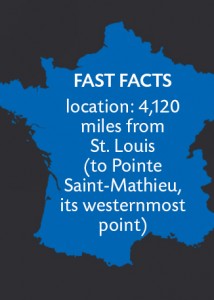Bordered by the Atlantic and Mediterranean worlds, defined by a millenia-old culture and a rapidly changing society, the French Republic offers Washington University scholars a melding of the old and the new.

Food and the French Countryside
Venus Bivar, PhD, assistant professor of history in Arts & Sciences
The French countryside is the setting for Bivar’s research on its post–World War II shift from individual production to industrialized agriculture and its development as a major player in the global trade of foodstuffs. In summer 2013, she spent six weeks in France, including four working in the municipal archives in Angers, researching the history of organic agriculture, which has been alternately played out as high-end gastronomy, conservative backlash, and part of the back-to-the-land movement of the late 1960s.
A Kinder Shock
Igor Efimov, PhD, the Lucy and Stanley Lopata Distinguished Professor in the School of Engineering & Applied Science; Sarah Gutbrod, doctoral candidate in biomedical engineering
Together with colleagues in Bordeaux, Efimov spent summer 2013 conducting experiments that could one day lead to a new treatment for patients who have an irregular heartbeat. With assistance from Gutbrod, the team is studying low-energy defibrillation. The treatment uses three stages of electric shocks with decreasing energy levels, which may be more effective and less painful to the patient, instead of one large shock to return the heart to a normal rhythm.
The Scent of Marseille
Seth Graebner, PhD, associate professor of French in Arts & Sciences
Graebner’s work focuses on the relationship between France and the Arabo-Muslim and African worlds. During his two months in Paris in spring 2013, he explored the Bibliothèque Nationale’s collection on Marseille to see how 19th-century writers described the city. Having found that nearly everyone described how pungent the port smelled, he is writing a book chapter about how perceptions of Marseille’s odors had political and racial overtones in a city viewed as France’s window on the world.
An American Lawyer in Paris
Leila Sadat, JD, the Henry H. Oberschelp Professor and director of the Whitney R. Harris World Law Institute in the School of Law
Sadat spent the spring 2011 semester as the Alexis de Tocqueville Distinguished Fulbright Chair in Paris, France, the first female academic to receive this honor. Sadat’s academic home was the University of Cergy-Pontoise, where she taught two courses and conducted her research. During her Fulbright she gave more than 16 lectures in French and English, appeared on French television, and advanced her work promoting the adoption of a global convention on Crimes Against Humanity, a project that the U.N. International Law Commission recognized last July.
The Meaning of Breast Cancer
Carolyn Sargent, PhD, professor of anthropology in Arts & Sciences; Peter Benson, PhD, associate professor of anthropology in Arts & Sciences; and Stéphanie Larchanché, PhD ’10, research fellow, École des Hautes Études, Paris
In June 2013, Sargent, Benson and Larchanché began a two-year study working with 40 women who have immigrated to Paris from the Senegal River Valley and who have been diagnosed with breast cancer. Often, they have no vocabulary word in their native language for cancer. The goal is to learn how the West African women understand the disease and its treatments and to document how it changes their understanding of themselves, their bodies and their mortality.